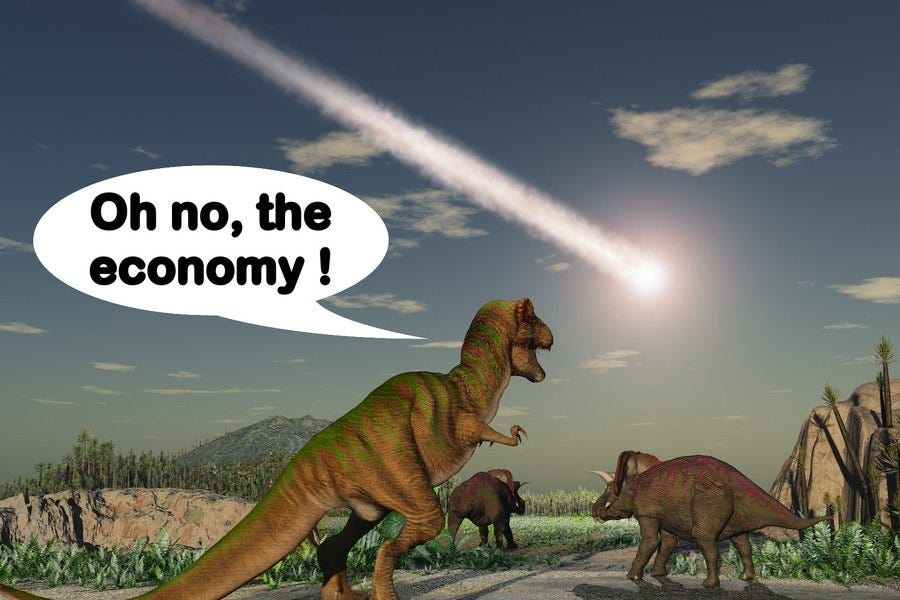Despite seemingly daily revelations of new scandals and a wave of denunciations from almost everyone who served under him in his first term, Donald Trump is still the front-runner in the upcoming presidential election. I think Trump is extraordinarily dangerous in terms of his foreign policy — by abandoning allies, he’ll fracture the “free world” coalition that won the first Cold War, and leave Eurasia open to Chinese and Russian domination:
I also think four more years of a Trump presidency would be corrosive to American society as a whole, since it would bring back at least some of the bitterness and unrest that prevailed during his first term:
Those are my main reasons not to vote for Trump. But in addition, it’s also worth thinking about Trump’s economic policy ideas, and what kind of opportunities and dangers they might present.
Trump basically has three main economic policy proposals:
-
Mass deportation of illegal immigrants
-
Very high tariffs on China, and moderate tariffs on imported goods from all other countries
-
Very large tax cuts
Twenty-three Nobel-winning economists just signed a letter saying that Trump’s economic policies would be bad for the country. Some excerpts:
While each of us has different views on the particulars of various economic policies, we believe that, overall, Harris’s economic agenda will improve our nation’s health, investment, sustainability, resilience, employment opportunities, and fairness and be vastly superior to the counterproductive economic agenda of Donald Trump.
His policies, including high tariffs even on goods from our friends and allies and regressive tax cuts for corporations and individuals, will lead to higher prices, larger deficits, and greater inequality…By contrast, Harris has emphasized policies that strengthen the middle class, enhance competition, and promote entrepreneurship. On issue after issue, Harris’s economic agenda will do far more than Donald Trump’s to increase the economic strength and well-being of our nation and its people.
Simply put, Harris’s policies will result in a stronger economic performance, with economic growth that is more robust, more sustainable, and more equitable.
I don’t have quite as much confidence in Harris’ economic policy program as these top economists do — I’m worried about the amount of debt it would incur — but she definitely does want to promote entrepreneurship and enhance competition. And I would expect her to continue Biden’s industrial policies, which (as regular readers all know) I am a huge fan of.
When it comes to the dangers of Trump’s policy program, I’m pretty much in complete agreement with what the economists say here. But I think it’s useful to lay out what I think the risks of these policies are, and which ones we should be especially worried about. Basically, I think mass deportation and tariffs will be modestly harmful but not catastrophic, while Trump’s tax cuts would put the U.S. on a very dangerous path.
As I’ve written before, mass deportations aren’t economically useful. Illegal immigrants, like other mostly lower-skilled immigrants, don’t really raise prices or compete down native-born Americans’ wages overall, so deportations won’t make us richer. In fact, deportations could hurt the U.S. economy a little bit, because they make it harder for businesses in immigrant-heavy industries — housekeeping, landscaping, construction, and so on — to find workers. A number of these businesses could shut down if they abruptly lost their workers.
Evidence on mass deportation is mixed. Clemens et al. (2017) find that kicking out a bunch of agricultural guest workers in the 1960s had no measurable effect on the labor market. But East et al. (2023) look at an Obama program that deported 400,000 illegal immigrants, and find that it did reduce wages and employment for native-born Americans by a modest amount. In any case, the potential economic harms don’t seem very large.
Regarding tariffs, I actually think higher tariffs on Chinese goods would be good — not for the U.S. economy, but for our national security and for the rest of the world (perhaps even including China). I also think that Trump’s hyperbolic threats of 1000 percent tariffs or higher are unlikely to actually materialize.
Tariffs on friendly countries, however, are bad. They’re going to hurt U.S. manufacturing, by depriving American manufacturers of intermediate inputs — materials, parts, etc. — and thus raising their costs. In fact, research shows that this is a pretty predictable negative effect of tariffs. Of course, tariffs also make daily life more expensive for American consumers — a price that we should be willing to pay with respect to China, but that it’s pointless to pay with respect to Europe, Korea, or Japan. And starting a trade war with the entire world is likely to lead to retaliatory tariffs on American exports, hurting U.S. businesses further.
The damage will be limited, however, by exchange rate adjustment. When a country puts up big tariffs, its exchange rate appreciates, because its demand for other countries’ currencies falls. This makes imports cheaper for that country, partially cancelling out the effects of the tariff. You can see the dollar gaining strength after Trump’s original tariffs went into effect in 2018:
So I think that while tariffs on allies are a terrible policy, their economic harm is to some degree self-limiting.
In sum, I don’t see the possibility of economic catastrophe from either of these policies.
Tax cuts, however, are another matter. People don’t seem to realize the sheer scale of the tax cuts Trump is proposing — without any spending cuts to balance them out.
The Penn Wharton Budget Model — a tool for analyzing the fiscal effects of policy proposals — spits out some very startling numbers for the Harris and Trump policy agendas. Harris’ policy program is a bit worrying — over ten years, it would add $1.2 trillion to America’s current $35.8 trillion of debt. But it’s absolutely dwarfed by what Trump’s program would do. The model shows Trump’s tax cut proposals raising the debt by $5.8 trillion by 2035. Here, via Axios, is a picture of the model’s assessments for the two campaigns:
Some estimates are even higher. The Committee for a Responsible Federal Budget thinks Harris’ plans would add $3.5 trillion to the debt, but that Trump’s would add $7.5 trillion — with the possibility of even higher increases:
That’s bad news for America in general. It suggests that our politics are incapable of generating balanced budgets, even in a booming economy. Both parties feel the need to promise both low taxes and higher spending in order to win elections over their rivals.
But this doesn’t mean both sides are the same. Republicans have generally been less fiscally responsible than Democrats over the past half century. And Trump’s promises are clearly far, far more lavish than Harris’. So if you care about debt, Harris is definitely the lesser of two evils here.
And in fact, there’s another reason to worry about Trump’s deficit-exploding proposals, beyond the simple fact that they’re much larger than Harris’.
What’s the problem with high government debt? If it gets high enough, you can get a hyperinflationary collapse. Even in the extreme scenario, I don’t see Trump’s deficits causing that sort of epic catastrophe during the next four years. His reckless borrowing would probably have to be continued long past the end of his term for that to happen.
But there are much more realistic dangers from Trump’s debt binge. The government’s monthly interest rate costs are already rising, and Trump’s huge deficits would add fuel to that fire:
If you want to keep borrowing like there’s no tomorrow, the only way to prevent interest costs from eating the federal budget is to lower interest rates. But the Fed controls interest rates, not the President. We have an independent central bank. And they’re not going to want to keep rates low just to support Trump’s irresponsible borrowing.
There’s a good chance that Trump will fight back by trying to compromise Fed independence. In other words, he’ll try to use his presidential powers to force the Fed to cut interest rates by a lot, in order to finance his massive debt binge. If you think this is just me imagining stuff, you should realize that Trump talks about doing this all the time! This is from August:
Republican candidate Donald Trump said on Thursday that U.S. presidents should have a say over decisions made by the Federal Reserve, the most explicit indication so far of his interest in infringing on the central bank’s independence should he regain the White House.
“I feel the president should have at least (a) say in there,” the former president told reporters at his Mar-a-Lago residence in Florida. “I think that in my case, I made a lot of money, I was very successful, and I think I have a better instinct than in many cases, people that would be on the Federal Reserve or the chairman.”
Trump allies have drafted proposals that would attempt to erode the Fed’s independence if he wins, the Wall Street Journal reported in April. The Trump campaign distanced itself from the report at the time.
But his remarks on Thursday indicate he is squarely aligned with one of the proposals’ main thrusts: If he becomes president, Trump should be consulted on interest rate decisions[.]
Just a few days ago, Trump repeated that he would be better than Powell at setting interest rates. And one of Trump’s advisors has floated the idea of creating a “shadow Fed chair” to pressure the Fed into obeying Trump’s wishes.
Low interest rates would reduce the immediate fiscal costs of Trump’s debt binge, but they would come with a price. If there’s still underlying inflationary pressure in the economy, low rates would accelerate inflation. Even more ominously, if businesspeople and investors realized that the Fed was no longer truly independent, it could touch off an inflationary spiral, where higher inflation expectations led to higher actual inflation.
Most economists believe that hyperinflation is caused by a country’s central bank financing large persistent government deficits. But even if it never got to the “hyper” level, Trump’s combination of huge deficits and destruction of Fed independence would represent the exact same kind of shock. It would let all of America know that the purpose of our central bank is now not to contain inflation, but to print money so that the President and Congress can borrow money cheaply.
In fact, Elon Musk — currently Trump’s biggest supporter — recognizes this. Back in August he tweeted the following:
In fact, this is just a prominent macroeconomic theory called the Fiscal Theory of the Price Level. The basic idea is exactly what Musk said — if people expect the central bank to print money to finance the government’s borrowing, inflation will rise.
Actually, tariffs could potentially exacerbate this situation. The one-off rise in consumer prices caused by Trump tariffs could add to the general perception that inflation is going up, which could help spark the upward spiral of inflationary expectations and actual inflation. But even if this didn’t happen, seeing Trump forcing the Fed to lower rates would provide a very clear public signal that a new inflationary era of unrestrained borrowing and money-printing is upon us.
So that, I think is the most dangerous realistic scenario of how Trump could damage the U.S. economy in just four years. Trump is promising voters the moon, and the only way to deliver will be to smash the system that has kept inflation contained for the last forty years.
There are many good reasons not to vote for Trump, but the fact that this is actually a plausible scenario is one more reason.








